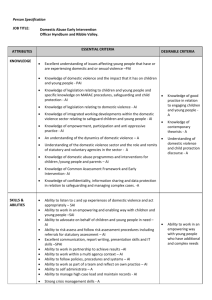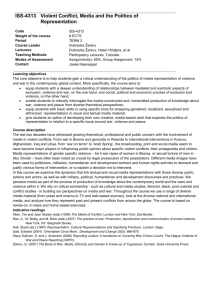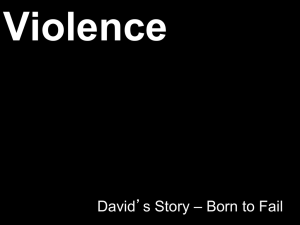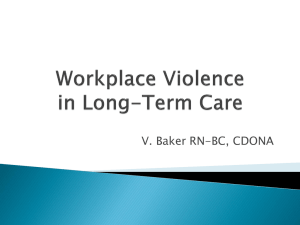Programs that Promote Healing and Improve Learning Outcomes for
advertisement
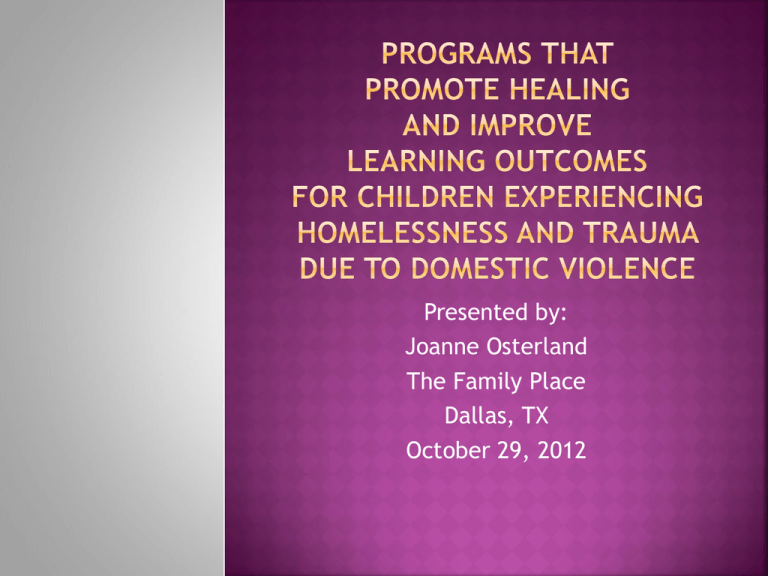
Presented by: Joanne Osterland The Family Place Dallas, TX October 29, 2012 The impact of exposure to domestic violence on infants and young children may show up as. . . Low birth weight Exaggerated startle response Sleep disturbances Difficulty attaching to caregiver Separation anxiety Eating disorders Crying, irritability Hyper-vigilance; anxiety around food or possessions Somatic complaints; may be ill or under-immunized Regression in toileting or language; delays in motor or social development School aged children may: explode, act up or act out and are unable to control their behavior. Internalize their feelings and hold them in or withdraw Be overly aware of parent responsibilities and problems Adolescents may be more likely to: --use drugs or alcohol --be harmed when they intervene in an assault --display attitudes supporting the use of violence --use violence in their own intimate relationships. Child Development Center (CDC) Licensed center for children ages 6 weeks-5 years; Experienced, knowledgeable, committed staff Each day provides a safe, comfortable, predictable routine to positively impact emotional distress Developmentally Appropriate Activities enhance cognitive development, teach appropriate social skills and provide for physical development of large and small motor skills. After-School and Summer Day Camp Programs (for School-Age Children) Provide children with the emotional tools that are prerequisites for academic success Teach children organizational and study skills Tutor children and offer homework help. Enrichment activities The Learning Center (on-site school) Multi-age class (grades K-2) to foster cooperative learning and build selfesteem. Individualized instruction based on assessment results. Center based activities allowing for learning through discovery and hands on activity. SCOREkeeper program Male mentors present to provide positive male role models Focus is on helping the boys to develop appropriate social, emotional, and life skills. Real Men Curriculum for middle school and high school boys CDC: 65% of children improved by 81% in age- appropriate developmental skills after 4 weeks School-Age: 58% began using study planners, 67% improved at least 25% of study skills after 4 weeks TLC: 87% of children improved in Reading; 75% in Math (pre to post of 6 months) In their own words. . . Environment Policies People Resources Create a safe, calm, comfortable environment. Add structure and clear expectations. Pay attention to children’s non verbal cues. Avoid struggles for power and control Model healthy and respectful relationships Give children choices. Help children learn what to do, rather than what not to do. Teach children to put feelings into words. Validate children’s feelings about their parents. Create opportunities for children to be successful Have fun together! Senior Source Early Childhood Intervention (ECI) Easter Seals Rainbow Days Captain Hope’s Kids Prevent Blindness Dimensions Educational Foundation/Nature Explore Educational First Steps Parkland Hospital Dallas Public Library Dallas After School Network Region 10 ESC Dallas ISD The single most critical factor in how children weather exposure to domestic violence is the presence of at least ONE loving and supportive adult in their life. That ONE adult may be YOU!! Hope & Healing: A Caregiver’s Guide to Helping Young Children Affected by Trauma, by Kathleen Fitzgerald Rice and Betsy McAlister Groves Helping Traumatized Children Learn, Massachusetts Advocates for Children-download free at http://www.massadvocates.org/order-book.php Understanding the Effects of Domestic Violence: A Trainer’s Manual for Early Childhood Educators, by Linda L. Baker, Peter G. Jaffe, and Kathy J. Moore-download free at http://www.lfcc.on.ca/understanding_ECE.html Children Exposed to Domestic Violence: A Teacher’s Handbook to Increase Understanding and Improve Community Responses, Centre for Children & Families in the Justice System, http://www.lfcc.on.ca/teacherus.PDF Joanne Osterland, Director Children’s Educational Services The Family Place 214-367-7736 www.familyplace.org 24-hour hotline 214-941-1991






